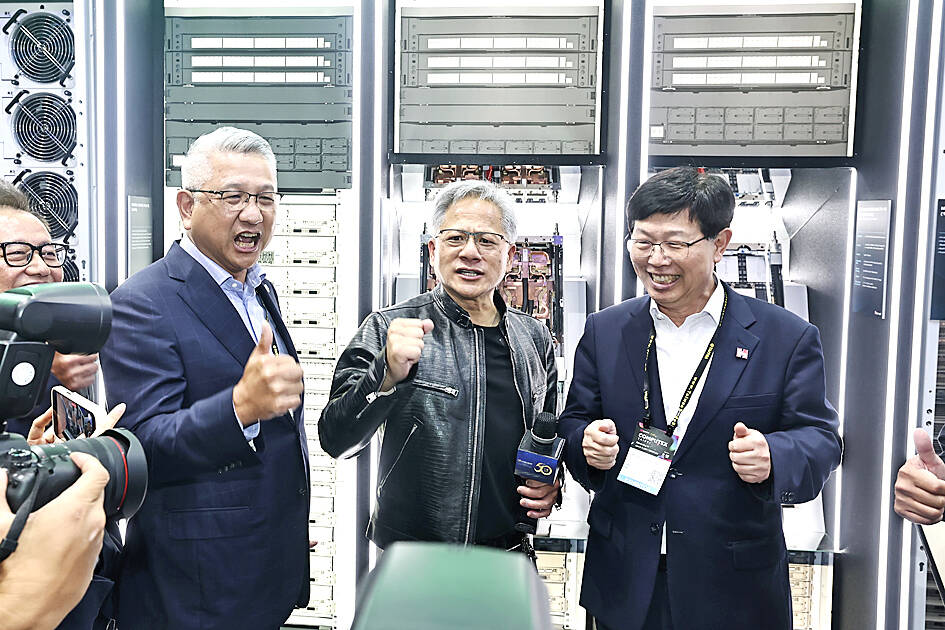Hon Hai Precision Industry Co (鴻海精密) yesterday announced that it plans to team up with Nvidia Corp to build an advanced computing center at the Kaohsiung Software Park (高雄軟體園區), with the US chip giant’s GB200 flagship chips at its core.
The computing center is to house artificial intelligence (AI) servers based on Nvidia’s latest AI chip — consisting of a total of 64 racks and 4,608 graphics processing units (GPUs), Hon Hai said.
Construction of the center is slated for completion by 2026, it added.

Photo: Fang Wei-chieh, Taipei Times
Through the latest collaboration, Hon Hai is banking on Nvidia’s AI technology to drive the development of its three smart platforms — smart manufacturing, smart electric vehicles (EV) and smart cities, Hon Hai said in a statement.
“Both companies will continue to deepen cooperation in AI, electric vehicles, smart factories, robots, smart cities and other fields, and demonstrate the strong competitiveness brought by AI through Foxconn’s huge manufacturing scale,” said the firm, which is Apple Inc’s largest contract manufacturer and is known as Foxconn Technology Group (富士康科技集團) internationally.
Hon Hai did not elaborate on how much it plans to invest in the center.
The company’s announcement came as Nvidia CEO Jensen Huang (黃仁勳) and Hon Hai chairman Young Liu (劉揚偉) met yesterday at a booth at Computex Taipei.
The booth belongs to Ingrasys Technology Inc (鴻佰科技), a Hon Hai subsidiary that makes Nvidia’s GB200 NVL72, a next-generation AI liquid-cooled rack solution and other Nvidia server products.
By leveraging Nvidia’s Omniverse and Isaac robotics platforms, coupled with Hon Hai’s image recognition technology and autonomous mobile robots, the company hopes to optimize its capacity utilization of AI server and EV production lines in Kaohsiung, it said.
In addition, Foxtron Vehicle Technologies Co’s (鴻華先進) new automotive manufacturing facilities in Kaohsiung’s Ciaotou District (橋頭) would become one of the group’s benchmark AI factories, it added.
Foxtron is an EV joint venture between Hon Hai and Yulon Motor Co (裕隆汽車). The new Ciaotou plant, which is under construction, is to use digital twin technology to achieve greater collaboration between virtual and physical production lines, as Foxtron is seeing electric bus orders outpace its current capacity, it said.
Upon the completion of the advanced computing center, the two companies will work with partners in the ecosystem to make generative AI applications a reality and help turn Kaohsiung into a smart city that would feature not just smart public transportation management, but also next-generation digital governance and medical health infused with generative AI technology, Hon Hai said.

MULTIFACETED: A task force has analyzed possible scenarios and created responses to assist domestic industries in dealing with US tariffs, the economics minister said The Executive Yuan is tomorrow to announce countermeasures to US President Donald Trump’s planned reciprocal tariffs, although the details of the plan would not be made public until Monday next week, Minister of Economic Affairs J.W. Kuo (郭智輝) said yesterday. The Cabinet established an economic and trade task force in November last year to deal with US trade and tariff related issues, Kuo told reporters outside the legislature in Taipei. The task force has been analyzing and evaluating all kinds of scenarios to identify suitable responses and determine how best to assist domestic industries in managing the effects of Trump’s tariffs, he

TIGHT-LIPPED: UMC said it had no merger plans at the moment, after Nikkei Asia reported that the firm and GlobalFoundries were considering restarting merger talks United Microelectronics Corp (UMC, 聯電), the world’s No. 4 contract chipmaker, yesterday launched a new US$5 billion 12-inch chip factory in Singapore as part of its latest effort to diversify its manufacturing footprint amid growing geopolitical risks. The new factory, adjacent to UMC’s existing Singapore fab in the Pasir Res Wafer Fab Park, is scheduled to enter volume production next year, utilizing mature 22-nanometer and 28-nanometer process technologies, UMC said in a statement. The company plans to invest US$5 billion during the first phase of the new fab, which would have an installed capacity of 30,000 12-inch wafers per month, it said. The

Taiwan’s official purchasing managers’ index (PMI) last month rose 0.2 percentage points to 54.2, in a second consecutive month of expansion, thanks to front-loading demand intended to avoid potential US tariff hikes, the Chung-Hua Institution for Economic Research (CIER, 中華經濟研究院) said yesterday. While short-term demand appeared robust, uncertainties rose due to US President Donald Trump’s unpredictable trade policy, CIER president Lien Hsien-ming (連賢明) told a news conference in Taipei. Taiwan’s economy this year would be characterized by high-level fluctuations and the volatility would be wilder than most expect, Lien said Demand for electronics, particularly semiconductors, continues to benefit from US technology giants’ effort

‘SWASTICAR’: Tesla CEO Elon Musk’s close association with Donald Trump has prompted opponents to brand him a ‘Nazi’ and resulted in a dramatic drop in sales Demonstrators descended on Tesla Inc dealerships across the US, and in Europe and Canada on Saturday to protest company chief Elon Musk, who has amassed extraordinary power as a top adviser to US President Donald Trump. Waving signs with messages such as “Musk is stealing our money” and “Reclaim our country,” the protests largely took place peacefully following fiery episodes of vandalism on Tesla vehicles, dealerships and other facilities in recent weeks that US officials have denounced as terrorism. Hundreds rallied on Saturday outside the Tesla dealership in Manhattan. Some blasted Musk, the world’s richest man, while others demanded the shuttering of his